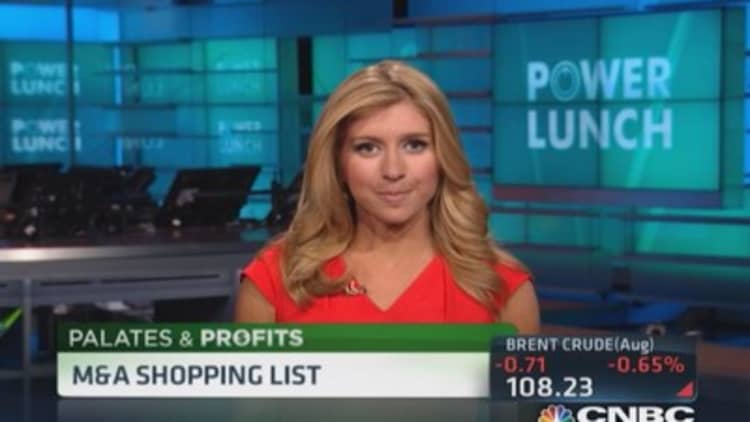The way that consumers would be informed when the food they buy has been genetically engineered—and perhaps whether they'd be informed at all—is being battled out in Congress and among industry and advocacy groups, with millions of dollars in play and some well-known, publicly traded companies acting as the key players.
The Environmental Working Group (EWG), a Washington-based environmental advocacy group, has compiled data showing that food companies' spending on lobbying grew dramatically leading up to the introduction of a bill dealing with genetically modified (GMO) food labeling earlier this year.
Read MoreTime for Chinesefast food chains to shine?
When it comes to total money spent on lobbying—including, but not limited to the GMO issue—companies like Pepsi, Coca-Cola, Hillshire Brands, and Land O'Lakes, among others, spent $9 million in the first quarter of 2014 alone, almost as much as they spent in all of 2013, according to lobbying disclosure forms.
Those companies are also members of the Grocery Manufacturers Association, which spent a total of $1.2 million on lobbying in the first quarter of 2014.
Associations and companies are not required to disclose the amount spent on a particular issue, and the grocery group could not provide a breakdown of how much money was spent on GMO lobbying specifically.
EWG says the rise in lobbying by such companies and organizations is meant to garner support for bills like the Safe and Accurate Food Labeling Act, introduced by Rep. Mike Pompeo , R-Kan., in April.
The measure would mandate that GMO labeling remain a national issue, under the discretion of the federal Food and Drug Administration.
Read MoreChina food scandal: US parent withdraws products
"GMO labeling should be in hands of the FDA, where it belongs," Grocery Manufacturing Association spokesman Brian Kennedy told CNBC.
"A patchwork of mandatory GMO labeling laws and regulations at the state and local level would only be confusing and costly for consumers and those who grow their food," he said.
"These differing standards would require food producers to establish different supply chains for different states, along with separate inventories and distribution channels, creating enormous expenses that could be passed on to consumers."
Read MoreNonprofitrestaurants: The real soul food
Several consumer advocacy groups, however, say that the Pompeo bill is meant to keep Americans in the dark about whether their food has been genetically modified. They've dubbed it Deny Americans the Right to Know (DARK).
EWG says that Americans overwhelmingly support GMO labeling, citing states such as Vermont, Oregon, Colorado, Connecticut and Maine that have been at the forefront of trying to enact mandatory GMO labeling.
What this bill does is ratifies the status quo by supporting a voluntary labeling system that has not worked and that has failed consumers.Scott SaberSenior vice president for Government Affairs, EWG
Vermont became the first state to pass such legislation; however, just two months later, four national industry groups filed a lawsuit to block the measure, saying the bill was costly and unconstitutional.
Tom Tunnell, president and CEO of the Kansas Agribusiness Retailers Association, which represents 900 agribusiness in Kansas, reached out to CNBC to voice his support for Pompeo's bill.
"It is important to the crop production industry that we have a federal standard by which the labeling of GMO is determined, and not a hodge-podge of state requirements," Tunnell said. "It's fine if the label includes that information, but it should be done at federal level."
Read MoreMeet the '4%': Small number of farms dominates US
Other organizations, including the Kansas Association of Wheat Growers and Kansas Soybean Association, called to voice their support for Pompeo's bill as well.
The data that Environmental Working Group has compiled also show that Pompeo received about $21,000 from PAC contributions in the current election cycle.
Asked about the contributions, Pompeo told CNBC that his position on GMOs was shaped not by contributions but by a desire to protect Kansas farmers.

"Farmers and agricultural groups all over the state and across the country agree that this is common-sense policy and have overwhelmingly supported my campaign," he said.
Gregory Jaffe, director of the Biotechnology Project at the Center for Science in the Public Interest (CSPI), told CNBC that mandatory GMO labeling should be a national standard.
"Genetically engineered crops are safe to eat, so safety is not a reason to label these foods," Jaffe said. "If it's not safe, we should not be labeling it; we should be taking it off the market altogether."
Read More
The center advocates a mandatory premarket approval process by FDA, saying that the idea that unsafe food would be allowed, but labeled, is not good policy.
EWG and groups like Center for Food Safety and Consumers Union also see a big issue with allowing GMO labeling to be up to the FDA.
"What this bill does is ratifies the status quo by supporting a voluntary labeling system that has not worked and that has failed consumers," Scott Faber, EWG's senior vice president for government affairs, told CNBC. "They want to block states from protecting consumers in the absence of federal leadership."
Faber is a former lobbyist for the Grocery Manufacturers Association.
The Energy and Commerce Committee is set to hold a hearing on the bill, though no specific date has been set yet.
—By CNBC's Dina Gusovsky


